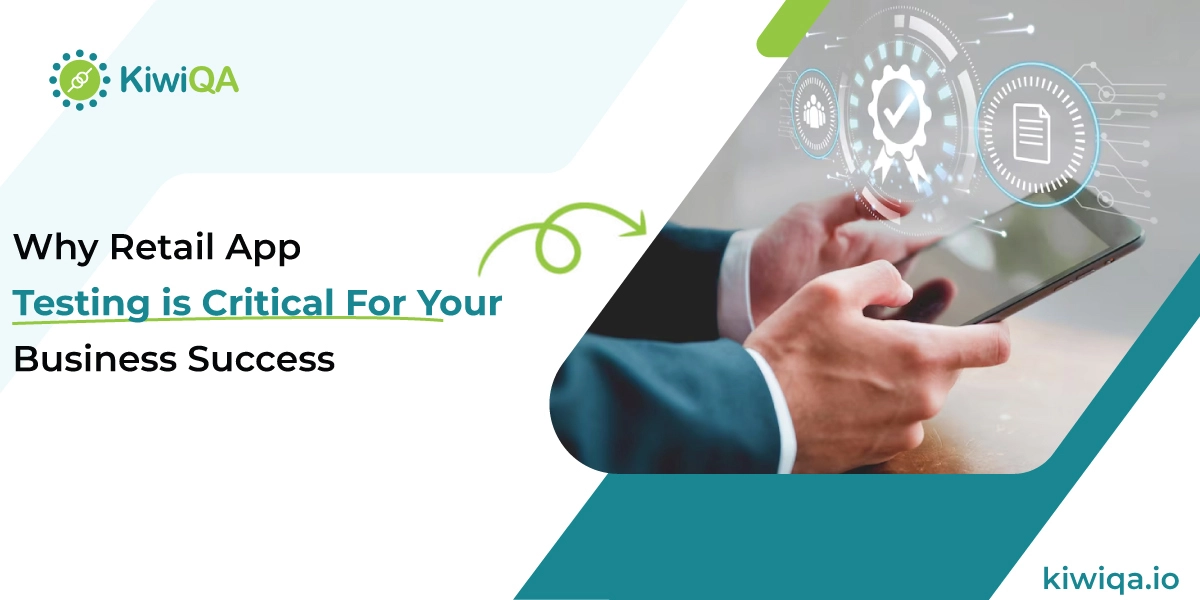Why Retail App Testing is Critical For Your Business Success?

 KiwiQA
KiwiQATable of Contents
Over the last few years, the retail industry has witnessed significant changes. The industry has come a long way to become a sophisticated chain. Emerging technologies, strong competition, and rising customer expectations are undergoing a strong transformation in the industry. Nowadays, the customer demands personalized, seamless experiences from online retail stores. To achieve the following goals, the retailers rely on various software applications & resources. The following blog describes why retail app testing is crucial for business success.
Developing & maintaining a retail application is not a simple task. The retail apps are dynamic and significantly integrated with the various 3rd party services. These retail applications handle a bunch of user data. In the year 2021, retail e-commerce witnessed 4.9 trillion US dollars, and the value is expected to grow by 50% over the next years up to 2025.
Any type of error, glitches, and bugs in the application can result in dissatisfaction, which further leads to security breaches, revenue loss, and legal issues. This is why retail software testing services are a necessary component of the retail app development procedure. Testing of retail applications can streamline the operation and leverage the customer bond. In addition, it also removes issues such as security issues, complex navigation, poor accessibility, slow loading time, etc. By following the streamlining testing approach, retailers can lower the probability of their app abandonment.
Do you own a retail site that takes lots of time and seems clunky during the login process? Which payment gateways are available in your application, and what are the security systems? Does it offer a secure customer experience? To check out all these criteria, you need to go through the strong testing approaches. The mobile retail application testing services verify application stability.
It verifies whether the application handles more traffic. Software testing companies mostly use manual and automated testing methodologies to check whether their application is compatible with other devices and OS. Ensuring comprehensive testing during the launch of the application is crucial so that the users can enjoy a seamless and delicate online purchasing experience. Customers always desire an error-free and secure experience, and to meet their expectations, the retail business should invest in software testing methodologies.
The retail app involves various components like payment options, shipping options, quotes, inventory, etc. The retail app testing verifies the synchronization & proper functioning of components. It is necessary to develop a testing strategy to verify there is no issue found during the production procedure. Developing & designing retail apps has become tough with the evolution of customer needs.
The retail application testing can keep the development costs under control & also foster the end product quality. In addition, retail app testing ensures the app is secure from cyber-attacks. The app needs to be tested by retail testing services under various load levels so that it can meet end-user expectations. The retail industry leverages various software platforms for the management of daily operations. Being an owner of a retail business, it’s necessary to perform strong testing approaches for the maintenance of software efficiency & quality.
The retail testing software helps retail owners deliver smooth and streamlined shopping experiences to customers, utilizing different devices, channels, and geographical areas. The software testing of retail apps also helps retailers identify & fix issues that might affect the satisfaction of customers. Following the testing approach can keep your application free from issues like slow loading, payment failure, broken links, etc.
Through security testing of retail applications, retailers can protect their data, applications, and customers from fraud, cyberattacks & theft. The retail app testing services also help retailers comply with multiple standards and regulations like GDPR, PCI, ISO 27001, etc.
In the current age, the performance of any retail software becomes crucial. Customers lose interest when software takes time to process and load. Testing the retail application ensures the app is smoothly functioning and efficiently running. A well-established testing strategy verifies the app works across the various operating systems and devices.
When retail businesses perform testing, they can detect earlier issues that lead to low development and maintenance costs. End-to-end testing also improves the operational efficiency and scalability of retail application testing.
By performing this e-commerce mobile app testing, you can verify that the app complies with the initial specifications. Ensuring that thorough test cases are developed and run across many operating systems, browsers, and mobile devices is crucial during functional testing. We may build automated or manual testing environments to confirm end-to-end operation. Using the most recent technologies, we should build a system of automation that will execute all online and mobile test cases.
Applications that pass usability testing can be beneficial for people with specific requirements. There are many accessibility options available for accessing an application on an iOS or Android mobile device. The application’s information needs to be readable, functional, comprehensible, and resilient across a wide range of platforms & devices.
Response rates for retail applications have to be extremely fast. The behavior of customers is quite unpredictable these days, and they will abandon the website if the application takes longer than normal to respond. Performance testing uses load to verify the application is responsive & stable.
The primary component of a retail application is security testing. It will guarantee that attackers and unlicensed individuals cannot access the program. Additionally, it’s critical to guarantee that the application’s payment methods are safe and no confidential data may be stolen by unknown users.
Compatibility testing is done to determine an application’s compatibility through software testing in retail with various contexts. It is possible through both testing methods. Compatibility testing is necessary to verify that the retail software is compatible with the hardware, operating system, web browser, and mobile devices.
To find possible errors, testing for compatibility involves investigating and comparing an application’s accessibility to mobile devices, operating systems, and browser platforms. Non-functional testing verifies that the app functions perfectly on every device, which guarantees client fulfillment.
Businesses do compliance testing to ensure that their application adheres to a variety of regulations and rules, both internal/external. The testing is performed through a nonfunctional testing technique that is used to confirm if the goods meet the requirements of the company. Compliance testing is a word that is commonly used to describe the process of carefully examining an application to ensure that it satisfies specific requirements.
To adopt the strategic approach for retail application testing, integrating both automated and manual testing is crucial. Automated testing brings lots of benefits with its various capabilities. Well, some software testing varieties are tough to automate. In these scenarios, manual testing comes to the frame. Choosing between any of the two tests is tough because each has significant benefits and drawbacks. Both testing types are required equally, so you need to strike the right balance. Integrating both testing types ensures comprehensive coverage and delivers optimal results.
Software is tested at every phase of the SDLC using software testing in DevOps or Agile. Continuous testing is a recommended technique that is frequently connected to Agile or DevOps methodologies. It contributes to quality assurance, and ongoing testing is necessary. Early problem detection saves businesses time and resources, as production-related bug fixes can be costly.
By following smart DevOps practices or retail software testing services, you can enhance the quality & reliability of retail applications. The continuous testing & DevOps practices in retail applications minimize the organization risks, improve the security risks, and keep your visitors engaged.
The retail business has been significant and has employed millions of people worldwide. Organizations are seeking processes to stay ahead of their competitors. Retailers have been using artificial intelligence more and more in recent months to assist them in dealing with the difficulties they encounter. Artificial intelligence (AI) is reshaping the retail sector by empowering companies to make knowledgeable decisions.
AI is increasing sales, decreasing out-of-stock scenarios, and optimizing labor and restocking costs. Using analytics through AI-powered resources helps to identify user behavior patterns & testing. The AI-driven approaches to retail software can improve testing coverage and efficiency.
In the retail environment, artificial intelligence (AI) has become a key player in ushering in a new era of unmatched insights and unrealized possibilities. By leveraging sophisticated algorithms & machine learning capabilities, artificial intelligence (AI) provides merchants with a vast array of sophisticated data and insights.
Because of the need for efficient operations and shifting consumer preferences, the worldwide AI market for retail is expected to develop significantly. AI is being more widely used in retail, and this rising market indicates that it is an appealing choice for retailers trying to increase productivity and optimize ROI. This pattern indicates that utilizing AI-based solutions in the retail industry may be an appealing option for company efficiency and development.
Retail software/app testing may be performed by combining automated testing with manual testing methodologies. The retail industry is transforming every day to match the customer demands. Retailers may update their applications through software testing and ensure their scalability and user-friendliness.
Businesses are putting more and more emphasis on effective testing for their retail apps to provide a smooth consumer experience and boost ROI. Retail organizations should invest in comprehensive software testing and retail strategies to improve application performance and boost user engagement and growth.
Join the like-minded community & get the latest updates and insights on software testing technological transformation around the globe. Don't miss out.
